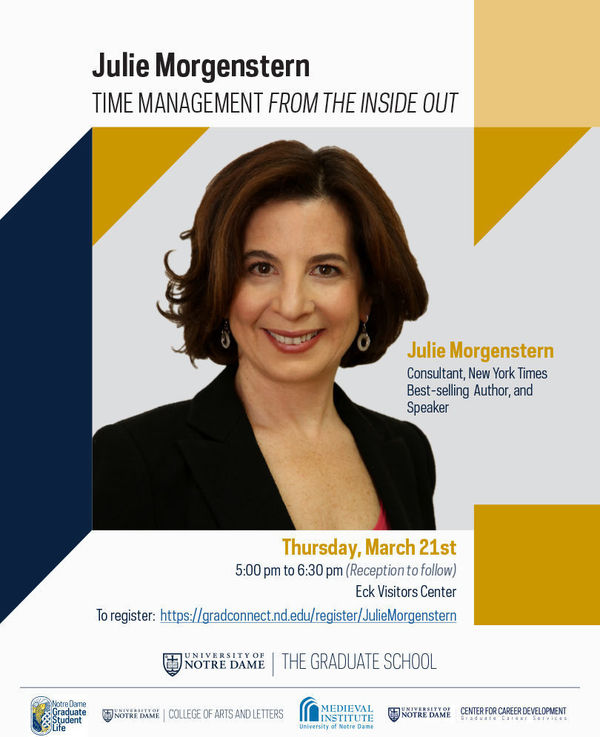Acclaimed Time Management Expert Offers Special Seminar for Grad Students

On March 21st, the Medieval Institute, together with the Graduate School, Graduate Career Services, and Graduate Student Life, welcomed Julie Morgenstern to Notre Dame for a special seminar on time management, designed for graduate students. Morgenstern is an internationally renowned expert on time management, productivity, and organizing, and a best-selling author of books such as Time Management from the Inside Out, Shed Your Stuff, Change Your Life, and Time to Parent. Time management, in Morgenstern’s approach, is a skill that anyone can learn. However, she says, “Good time management is not about buying a great calendar or planner. It is not about learning tricks to move faster, or about doing everything with mechanical efficiency. It’s about creating days that are meaningful and rewarding to you, and feeling a sense of satisfaction in each and every one of your tasks.”
Morgenstern’s techniques take into account an individual’s personality and goals, rather than being a one-size-fit-all imposition of rules. She opened the seminar by asking participants to think of what they would do with a twenty-fifth hour in the day, what they tended to procrastinate on, and other things that vary from person to person. “Finding the twenty-fifth hour,” she said, means looking at time in a different way; organizing space is easier than organizing time, but the principles are in fact similar.
Morgenstern encourages “time realism,” that is, being realistic about how long things take, as a “gateway skill,” as well as knowing and respecting one’s own “concentration threshold” for a given type of task. Though she offers several time management tools that can be implemented in practical ways, she also encourages clients to look at “big picture” goals in various domains of life, clarifying what is really important to them. These goals rarely change much, she says; they are more like values. Morgenstern draws a clear distinction between “goals” and “activities.” Our activities are in service of our goals, and take a certain amount of time that it is possible to calculate. Morgenstern ended by prompting participants to put one thing back on their schedule that they had been neglecting, something that would give them the greatest sense of happiness or wholeness. “How you spend your time,” she said, “is how you spend your life.”
This seminar was part of the Serving Up Knowledge Series offered by the Graduate School, and the Institute and its partners brought Morgenstern to campus as part of our work supporting graduate students in acquiring skills critical to not just completion of their degrees and continuation of their careers beyond graduate school, but to leading fulfilling and fruitful lives. We were glad to welcome her and look forward to continuing to support our students in this and many other ways.